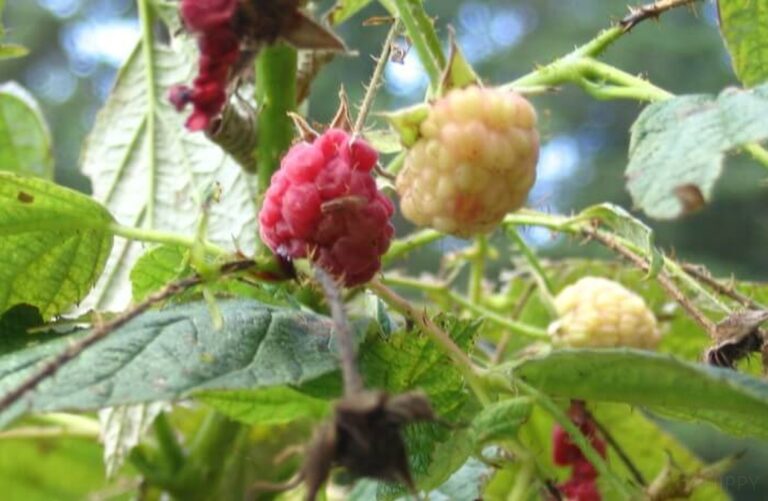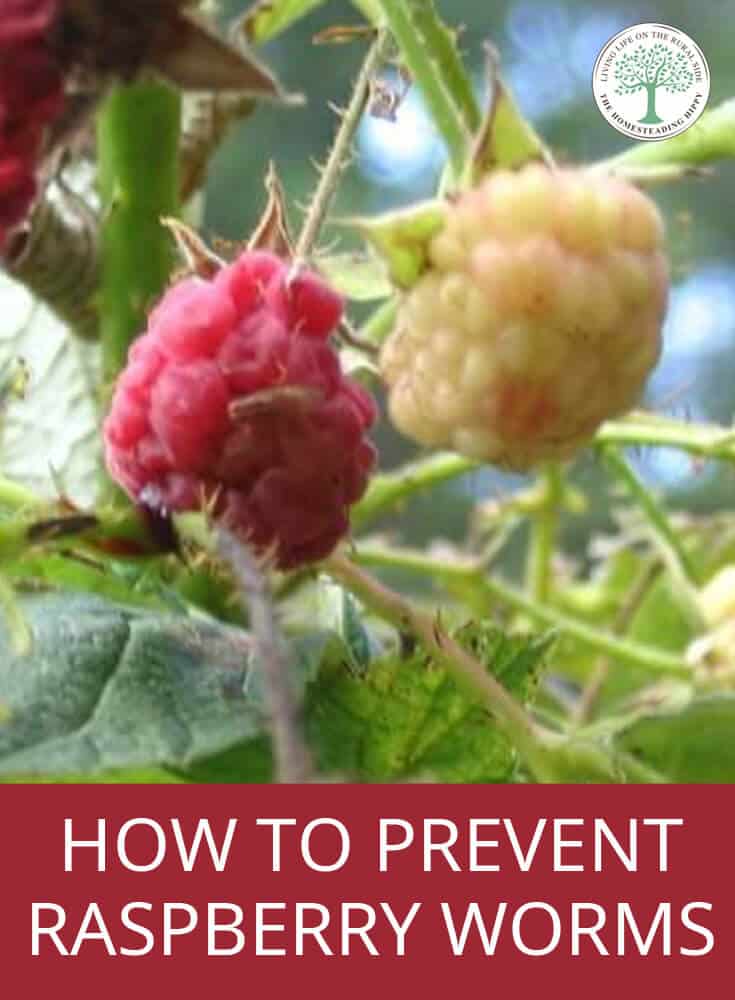Move over, aphids. Your garden has a new pest that you’ll need to watch out for (and worry about!): raspberry worms.
If you have fruit plants, like raspberries, blackberries, grapes, blueberries, cherries, peaches, or strawberries, you may have heard of the raspberry worm.

These nasty pests aren’t picky – in addition to raspberries, they’ll also infest the other plants listed above, as well as tomatoes, apricots, apricots, loganberries, salmonberries, thimbleberries, and apples.
Unfortunately, this aggressive pest is here to stay. While you might only notice them in small quantities to begin with, once they get settled, they’ll quickly grow into a difficult-to-manage infestation.
What Are Raspberry Worms?
Raspberry worms are the larvae of a small beetle known as the raspberry beetle (or Byturus unicolor, if you are feeling scientific). These beetles only grow to about ⅕ of an inch in length.
They possess reddish-brown bodies with tiny, narrow hairs. The adult beetles feed on the leaves of raspberry canes, preferring to munch on young canes and leaves.
They mate on or near the flowers of the raspberry plant, leaving their eggs behind to spawn more larvae.
These pests usually appear in the early spring, typically in mid-April or early to mid-May. They will completely remove the surface tissues from your raspberry leaves, even going so far as to eat flower buds and bud clusters.
Usually, the damage from the beetles themselves is not detrimental to the entire plant, and your raspberry bush should be able to recover.
Raspberry worms, though, are a whole different story. These pests can cause major damage.
When raspberry worms hatch, they burrow into raspberry fruit caps, causing the fruits to shrivel up and die, or to fall off the plant before they have ripened. Your harvest is usually substantially diminished when raspberry worms set up shop.
This makes them a serious problem for commercial raspberry growers.
The Life Cycle of Raspberry Worms
Raspberry worms will typically overwinter in the soil and under all the leaf litter, and emerge to gorge themselves on fruits and canes.
The life cycle of raspberry worms starts with the adult raspberry beetles. Without getting into the whole ‘birds and bees’ talk, adult beetles emerge in spring (mid-April to mid-May) and mate.
The females lay eggs on or close to the flower buds and immature fruits. When they hatch, the larvae have easy access to the fruit and will chow down until there’s nothing left on which to gorge themselves.
Around 30 – 40 days after hatching (the larval stage), raspberry worms will pupate and develop into adult beetles.
How Will I Know That I Have a Raspberry Worm Infestation?
You may notice raspberry worms or beetles crawling on your plants, but if you aren’t sure whether these are the culprits to blame, you can perform a simple test to make sure.
Cut open or crush the fruit of your raspberry plant carefully. Look for larvae – they look like tiny white worms.
Sometimes, these larvae can be tough to tell apart from seeds or pulp, but usually, the larvae will move – at least a little bit. Seeds, on the other hand, will of course not move.
Often, there will be several larvae in every berry. Typically, berries that are soft or overripe are more vulnerable.
If you find larvae, you can bring them to your local cooperative extension to have them tested – or you can just go ahead and assume that they are raspberry worms or another dangerous pest.
How to Prevent Raspberry Worms in the Garden
Here are some tips to prevent raspberry worms in your garden so that you can enjoy a bountiful harvest year after year.
1. Be vigilant
While raspberry worms are still a relatively new pest in many areas of the country, they are still a pest that you will need to watch out for.
Infestations often emerge quickly, and being familiar with your plants and their health can help you reduce the likelihood of a major, devastating infestation.
Inspect your plants regularly for illness or damage, and make sure you keep good records so that you can prevent other related problems, too.
2. Harvest fruit regularly
Harvesting your ripe fruit will help reduce the places where raspberry worms can nestle and breed. Don’t leave overripe berries on the vine, and definitely don’t let them drop to the ground.
Remove berries as frequently as possible – ideally every day – and don’t compost berries that have been infested by raspberry worms.
Compost heat is not warm enough to kill larvae and they will lust keep coming back. It is safe, however, to feed overripe or infested berries to your chickens.
3. Prune your plants each season
This is a good general tip for growing fruit plants, but it is especially important if you are planting raspberry bushes. Try to trim your plants every season, ideally into the spring.
Raspberry worms and beetles like to live in humid, well-shaded locations. By pruning your plants, you deprive these creatures of precious habitats. You should also trellis any sprawling variety of plants so that you can keep everything contained.
#4. Burn-trimmed shoots and other garden waste
When you prune or trim your plants, don’t compost the trimmings.
This will allow the pests to spread to other plants in your garden, or to overwinter in the soil that you then use to fortify and fertilize your garden later on – yikes! Instead, burn the waste so that you can get rid of these pests for good.
#5. Clean up the ground
Raspberry worms won’t die off between seasons – the larvae can also overwinter in the soil and come back the following year, giving you endless months of agony as you see diminished harvests from your plants.
By cultivating the soil near your plants, you can expose the larvae to the elements and kill them off by exposing them to hot or cold air and nasty weather (like rain or snow).
You can also sprinkle diatomaceous earth around your plants at this time. It is believed that the gritty texture of the compound can kill the worms, who are sensitive to the abrasion and will dry out.
Raking or otherwise shallowly cultivating the soil near your raspberry canes can also help prevent and eliminate these pests. It works by breaking up the pupating larvae in the soil.
If you raise chickens, put them to work by letting them till up the soil near your plants – they won’t disturb your fruit, but they will prevent raspberry worms from settling in.
Controlling weeds or other debris around your plants can also help combat raspberry worms. Weeds provide valuable hiding places and breeding grounds for these pests – as well as for others! – and can also lead to the spread of disease.
6. Put out DIY traps
These have limited effectiveness in large raspberry patches, or when used for large infestations, but they can be effective in some situations. Use a homemade trap made out of pure vinegar or a combination of yeast and sugar.
Place the mixture in a cup and leave it near the base of the plant. These traps should be set out just as the fruits are beginning to appear on the plant, which will help you keep an eye on when the flies arrive.
You can also set traps at the end of the season to reduce the likelihood of an infestation the following year.
7. Cover your plants
Consider using row covers before raspberry worms become a problem. These will prevent the pests from landing on your plants to lay their eggs.
Just make sure you use a very thin row cover and close it so that the flies cannot get beneath the surface. Row covers can cause some problems with air circulation, so make sure you only use these when absolutely necessary.
8. Harvest in the spring
Harvesting your raspberries in the spring can help if you are growing ever-bearing fruit.
Because these worms tend to be more of a problem in the fall, starting in July, you can prevent ever having to deal with them by harvesting and pruning in the spring and early summer.
Remember the more berries you have in warm weather, the more likely it is that your plants are going to be affected by raspberry worms.
9. Drop the pests in a bucket of soapy water
A common home gardener’s solution to many pest infestations is soap. It also works well with raspberry worms.
Although this is somewhat laborious, you can go around to each plant and handpick the beetles. Try to do this before they’ve started to lay eggs. Remove each beetle and drop it into a bucket of soapy water. This will kill the bug instantly.
10. Spray a pesticide
Worst case scenario, you may have to apply a pesticide to get rid of raspberry worms for good. However, don’t be disheartened by thinking you need to apply a chemical-based pesticide. You can use an organic pesticide to get rid of these pests.
One to consider is spinosad. This is a microbial pesticide that is certified organic and is considered harmless to humans. Apply this product in the evening, as it can kill honeybees if it is applied when wet.
Spray your canes that have active beetle populations, or you can wait until the worms themselves appear. You might have to apply a second time, particularly after the plants have bloomed, to kill all of the worms.
Two other organic insecticides can help reduce raspberry worm populations. Try Pyganic or Entrust to get rid of these pests – both are safe around humans and can be effective when nothing else has worked in your raspberry patch.
Only use insecticides that are labeled safe to use on raspberries, and make sure you use the limits that are listed on the labels.
Even if you are using an organic insecticide, you should wait until the plants are no longer in bloom. You don’t want to apply insecticides that can harm local pollinators.
Treating Raspberry Worm Infestations with Pyrethrins
Pyrethrins are the chemicals found in pyrethrum extract (pyrethrum is found in certain chrysanthemum flowers).
Pyrethrins are commonly used in insecticides because they work quickly and break down quickly in the environment.
They’re usually combined with pyrethroids – synthetic substances with similar chemical structures – to make an effective pesticide.
These pesticides can be sprayed on the plants from planes, tractors, and/or handheld spray bottles.
Something to keep in mind is that there are significant health risks associated with them. Pyrethroids/pyrethrins are highly toxic and exposure – especially prolonged exposure – can cause serious health problems.
Pyrethroids/pyrethrins can affect the nervous system and brain producing symptoms ranging in severity from numbness and odd sensations (i.e. itching, burning, stinging, etc.) to changes in awareness, convulsions, and loss of consciousness.
Common Pesticides Used on Raspberry Worms
In addition to Spinosad, Entrust, and Pyganic, there are a few other options to use on raspberry worms if you need them.
- Neem Oil and Products: neem seeds have certain chemicals/substances that have insecticidal properties. These substances are used in many pesticides and are said to be very effective against raspberry worms.
- Synthetic pyrethroids: Cypermethrin, Deltamethrin, and Lambda-cyhalothrin are all synthetic pesticides that can be used on your raspberry plants to prevent worms. They are very effective, and you’ll likely get better results. As we said earlier, however, they’re pyrethroids. As such, they can cause very serious health issues so be careful when using them.
- Carbaryl: typically used to deal with aphids, fire ants, ticks, fleas, and spiders, you can also use Carbaryl to deal with raspberry worms. It’s important to be careful with this though, it can cause serious health problems.
- Diazinon: This one’s been in use since 1956, and originally was used to deal with household, garden, and pet pests. While residential use of Diazinon was banned in 2004 due to the health risks posed to people, you can still use this as a pesticide in agriculture. It’s typically used for fruit, veggie, nut, and field crops.
- Other hungry insects: Yes, you can use other bugs as pesticides. Trichogramma wasps and Ladybird beetles are two examples of insects that can be useful pesticides as they eat the raspberry worms. Attracting other hungry, worm-eating insects can help you clear out a raspberry worm problem.
What Happens If You Accidentally Eat a Raspberry Worm?
So you harvested your raspberries, dropped them in your bucket, and started nibbling as you continued to harvest your plants.
And then you notice that the plants are infested with raspberry worms. Gross!
Many people wonder whether accidentally eating a raspberry worm (or several) that are lying hidden in their raspberries will make them sick.
Luckily, most people have reported no adverse effects from eating these plants – besides a serious case of being grossed out! You can safely eat raspberry worms (though you probably wouldn’t want to) and they shouldn’t cause any problems.
Feeding raspberry worms to your chickens can actually provide them with some good protein while at the same time keeping populations down in your garden – something to remember if you want a quick method of getting rid of these pests.
Growing a raspberry patch is a great way to provide your family with easy access to tasty, nutritious fruit.
Berry picking is an enjoyable activity that shouldn’t be tarnished by raspberry worms. Take action today to prevent your harvest from being destroyed by these pernicious little pests.


Rebekah is a full-time homesteader. On her 22 acres, she raises chickens, sheep, and bees, not to mention she grows a wide variety of veggies. She has a huge greenhouse and does lots of DIY projects with her husband in her ever-growing homesteading endeavor. Learn more about Rebekah here.

I found these worms in my berries. The heat brought them out! I rinsed then froze them. It didn’t get rid of them all. So I made muffins. Mixed, baked, out of sight, out of mind!! Thanks for info. Now to apply a remedy & hopefully never see them again.
Soak raspberries in salted water and the worms surface to the top.
I found raspberry worms all over the berries I had placed in the refrigerator to prepare the next day. When I took them out of the frig they were crawling with the tiny white worms. I threw them away, dusted the whole patch (about 20′ x 6′) called the Extension Service and was told not to eat the berries. So they all went on to the ground…silly me…I hoped I had killed whatever was laying the eggs which became worms. Now I find out that I should have picked and destroyed the berries. I cut the canes back in the fall to stalks about 3 or 4 ft. tall and left them over winter.
Is there anything I could spray the ground with to kill the hatching beetles before they begin to lay eggs???? Please let me know.
While making raspberry freezer jam I saw 2 of these moving around. I thoroughly checked and decided to put the jam in the freezer so it wasnt wasted. Now having read about these raspberry worms I’m not sure what to do! Should I thaw it and cook it or throw it all away? Or just eat it?
according to the article, you’re probably fine. Just try not to think too much into it while you’re spreading it across your dishes 🙂